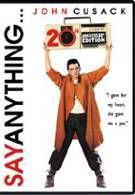What can I say about Say Anything that hasn’t been trod over a thousand times, sliced and diced to bits, ideas that still mean as much to a viewer as mush to Oliver Twist. Cameron Crowe is brilliant here in his directorial debut, and Randy Stone cobbled together a cast that is perfectly suited to each character’s roles and even propelled the careers of some. Oh yeah, and there is a scene where John Cusack holds a boombox in the air, propelling a love so deep and angsty any given audience will yearn alongside him. If you haven’t seen it, rent it. Now. Enter John Cusack as Lloyd Dobbler, charismatic and kind, and kinda the same character we’ve imagined for John Cusack for the past 20 years. Don’t get me wrong, the overt Cusack mechanisms and colloquial quips make him a MACHINE, and if I were John Cusack, I would gloat in the glory of being myself, maybe even pull a Whitman. Just because Cusack has perfected the nice guy with depth that doesn’t mar the surface, doesn’t mean he’s cheap, or trite, or boring as an actor (see: Will-Smithing up a script).
Enter Diane Court, played by scowl-jawed Iona Skye (a name I vividly remember because it stumped me in a crossword, once). Her character is prim, intelligent, and headed places (unlike her acting career). Coupling her stark intelligence and Lloyd’s carefree optimism leaves a kind of cocoon where the two are able to fall in love and bond together.
The plot, then, is as “basic” as Diane Court sees her new beau. The couple graduate from high school, heading into the real world. Lloyd Dobbler’s looking for a dare-to-be-great situation and (spoiler alert!) he finds it in his love for Diane Court. Insert a plethora of scenes more googley-eyed than the puppets on Eureeka’s Castle: scenes where the couple kiss in the rain and stay out all night just being together, or alternatively, lose their virginity in a car. There are moments where she shivers, she feels so happy. And there are situations in public where they talk about one another, supported by a cast of characters who speak in teen-not-quite-getting-it style about the real world -- a move that has been used since teen programming began (for a prime example, what the heck, I’ll go ahead and plug reruns of One Tree Hill). The difference between Say Anything and programming like One Tree Hill is that Cusack and Skye are earnestly portraying their on-screen romance. Cameron Crowe has stated that the couple might have had a little bit of a crush, and I believe it.
There are two snags to this little love affair. The first is that Diane plans to leave for school in England at the end of the summer. The second is that Diane is very close to her overprotective father (played by John Mahoney), who sees Lloyd as a bumbling threat to his daughter’s welfare. In the end, the couple is faced with the decision to be together or sever ties.
It’s a simple story, but it is separate from many others in its genre. People have applauded Annie Hall for its outside-the-box ideas about romance, but they should applaud Say Anything for its sincerity. You won’t find asides or oddities, here. You won’t find trite dialogue or minimal backdrops. Each aspect of the film is thought out but comes across as proportionate, proper, and real as a result. An audience will find direct dialogue. See: Lloyd at the beginning of the film, speaking to his sister, saying, “I’m sorry T.I.M. left you. But I am not T.I.M.” An audience will perceive bashful moments. See: when Lloyd picks Diane up for their first date and ridiculously loud music blares. He just turns it down succinctly and drives off while she smiles knowingly. There will be friends. Casting John Cusack’s friends, including a baby-faced Jeremy Piven, gives the film an added feeling of insider-ness. By this I mean the audience is inducted into this world of keymasters, this close-knit high school culture that exudes the right amount of information to supplement the romance itself.
It’s not really about whether or not Diane Court and Lloyd Dobbler exit holding hands, but about what it took to get to that point. I’m glad I know what I’m not missing. The disc is packed with alternate, deleted, and extended scenes, which are worth the watch, if only to prove Cameron Crowe’s ability to edit the unnecessary. There’s also some pretty sweet commentary on the film by Crowe himself. That’s where I gleaned many a hot fact in this article, and where you should, too.

After SVU And Organized Crime's Changes In 2024, Does Law And Order's Latest Twist Ending Mean New Directions For The Original Show?

Ryan Gosling's SNL Episode Went Viral, But Colin Jost Says Another Actor Is 'Especially Good' At The Table Read

So Help Me Todd: Todd Might Finally Get Some Romantic Good Luck, As A Big Change Could Be Coming For Lawrence
Most Popular



